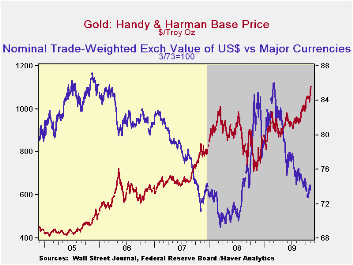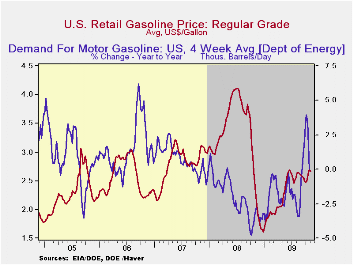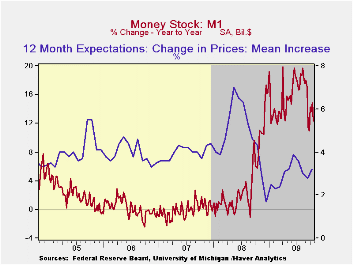 Global| Nov 10 2009
Global| Nov 10 2009Inflationary Signals Abound;Gold & Oil Prices Strengthen While Dollar Weakens
by:Tom Moeller
|in:Economy in Brief
Summary
There's little to suggest that current inflation is a problem for the U.S. economy as consumer & producer prices remain weak. Nevertheless, market signals suggest a future problem may be developing. Higher gold prices are one of the [...]
 There's
little to suggest that current inflation is a problem for the U.S.
economy as consumer & producer prices remain weak.
Nevertheless, market signals suggest a future problem may be
developing. Higher gold prices are one of the more visible indicators
of pending inflationary power with its rise yesterday to an all-time
high of $1,107 per ounce. That strength has been accompanied by a drop
in the trade-weighted value of the U.S. dollar to its lowest level
since the summer of last year.
There's
little to suggest that current inflation is a problem for the U.S.
economy as consumer & producer prices remain weak.
Nevertheless, market signals suggest a future problem may be
developing. Higher gold prices are one of the more visible indicators
of pending inflationary power with its rise yesterday to an all-time
high of $1,107 per ounce. That strength has been accompanied by a drop
in the trade-weighted value of the U.S. dollar to its lowest level
since the summer of last year.
U.S. monetary & fiscal stimulus has done much to generate this inflationary scenario. Low interest rates and the propping up of the banking system have combined to generate an excessive 60% y/y rise in the monetary base and 12% y/y growth in the money supply (M1). Fiscal stimulus is more-than-evident in the budget deficit which ballooned last year to $680 billion and is projected by OMB to be around $1 trillion for the next ten years. Of course, monetization of this deficit is the worry.
 The end of the U.S. recession
and of the recessions abroad have given rise to energy prices which
potentially could fuel higher inflation. Though they are down slightly
from the early-October high, crude oil prices at
an average $79.43 per barrel yesterday were up sharply from the
December low of $32.37. For all of last week the spot market price for
light sweet crude oil averaged $79.04 per barrel.
The end of the U.S. recession
and of the recessions abroad have given rise to energy prices which
potentially could fuel higher inflation. Though they are down slightly
from the early-October high, crude oil prices at
an average $79.43 per barrel yesterday were up sharply from the
December low of $32.37. For all of last week the spot market price for
light sweet crude oil averaged $79.04 per barrel.
Consumers have seen
this pricing strength, and worries abound. The pump price for
regular gasoline slipped last week to $2.67 per gallon which
was slightly below the June high. However, prices remain up from the
December low of $1.61 and this week the wholesale gasoline price
remained firm at $1.97. Though gas prices were down slightly from the
October high of $2.10, worries abound about the future for pricing
power.  The expected rate of inflation for the next year has risen to
3.2%, roughly double the December low according to the University of
Michigan's survey. Finally, higher gasoline prices have prompted a
cutback in driving. Following earlier strength, the demand for motor
gasoline fell slightly last week from one year earlier. The energy
price figures are reported by the U.S. Department of Energy and can be
found in Haver's WEEKLY & DAILY databases.
The gasoline demand figures are in OILWKLY.
The expected rate of inflation for the next year has risen to
3.2%, roughly double the December low according to the University of
Michigan's survey. Finally, higher gasoline prices have prompted a
cutback in driving. Following earlier strength, the demand for motor
gasoline fell slightly last week from one year earlier. The energy
price figures are reported by the U.S. Department of Energy and can be
found in Haver's WEEKLY & DAILY databases.
The gasoline demand figures are in OILWKLY.
Natural gas prices also have strengthened ahead of the winter heating season. They slipped last week to an average of $4.27 per mmbtu (-36.6% y/y). Though they remained down by two-thirds from the high of $13.19/mmbtu reached in early-July of last year, they are more than double the low reached early last month. A bit of good news for the pricing outlook occurred yesterday. Prices natural gas slipped further to $3.87/mmbtu.
| Weekly Prices | 11/09/09 | 10/19/09 | Y/Y | 2008 | 2007 | 2006 |
|---|---|---|---|---|---|---|
| Retail Regular Gasoline ($ per Gallon, Regular) | 2.67 | 2.69 | 19.9% | 3.25 | 2.80 | 2.57 |
| Light Sweet Crude Oil, WTI ($ per bbl.) | 79.04 | 78.51 | 22.9% | 100.16 | 72.25 | 66.12 |
Tom Moeller
AuthorMore in Author Profile »Prior to joining Haver Analytics in 2000, Mr. Moeller worked as the Economist at Chancellor Capital Management from 1985 to 1999. There, he developed comprehensive economic forecasts and interpreted economic data for equity and fixed income portfolio managers. Also at Chancellor, Mr. Moeller worked as an equity analyst and was responsible for researching and rating companies in the economically sensitive automobile and housing industries for investment in Chancellor’s equity portfolio. Prior to joining Chancellor, Mr. Moeller was an Economist at Citibank from 1979 to 1984. He also analyzed pricing behavior in the metals industry for the Council on Wage and Price Stability in Washington, D.C. In 1999, Mr. Moeller received the award for most accurate forecast from the Forecasters' Club of New York. From 1990 to 1992 he was President of the New York Association for Business Economists. Mr. Moeller earned an M.B.A. in Finance from Fordham University, where he graduated in 1987. He holds a Bachelor of Arts in Economics from George Washington University.






